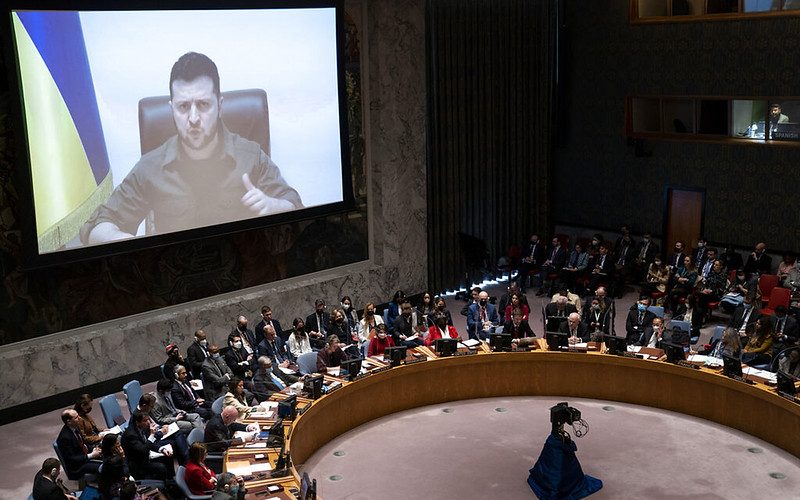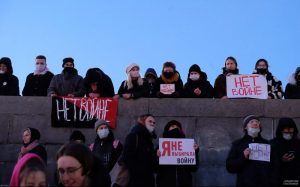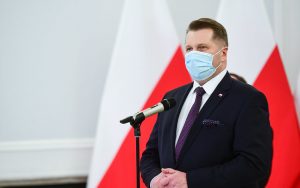When we talk about genocide, the picture of Hitler first comes to mind and reminds us of the atrocities committed under his regime from 1941 to 1945, which claimed the lives of a total of six million Jews. Yet, few recall that Soviet leaders in the 1930s, led by Joseph Stalin, staged a famine that killed millions as they sought to consolidate agricultural power, an event that experts today call the genocide that killed at least four million people. However, Soviet propaganda came to fruition as soon as the information about the mass famine spread. “This is not simply a case of mass murder. It is a case of genocide, of destruction, not of individuals only, but a culture and a nation” (Serbyn, 2015).
Years passed and the Soviet Union collapsed but the evil embedded inside went nowhere, only the figures changed, and the Soviet policy of the Kremlin had for long been bloodied. It is difficult to be a neighbor of Russia because one fine morning the missiles may fall and the Kremlin’s policy will try to convince you that this is a “special military operation” and everything is happening for your own good, as happened in 2008 in Georgia. On August 8, 2008, Russian troops began invading Georgia and the first war in Europe in the 21st century began. The conflict itself ended in a few days, but the effects of the South Ossetia conflict are still reverberating 14 years later, forming a wider geopolitical landscape (CNN, 2022).
Six years later, Russia returned to Ukraine. The Maidan uprising stemmed from the failure of the Vilnius Summit, where Ukraine was supposed to sign a collective bargaining agreement with the European Union, but last-minute refused to sign the deal. The protest in Kyiv’s Central Maidan, which began in November 2013, resulted in an armed clash in the square between the protesters and the Berkut police in February 2014, eventually killing about 100 people, and lastly leading to the expulsion of President Viktor Yanukovych (OSF, 2019).
Russian troops invaded Crimea in late March 2014, annexed the peninsula and declared to hold a referendum on the peninsula’s autonomy that was far from democratic. Combat broke out in the eastern regions of Donetsk and Luhansk, and local governments were replaced by nationalist forces in the western regions. The Russian government argued that the neo-Nazis need to seize power and respond in Kyiv. It also claimed that the U.S. government was behind the riots, that there were officials in the square, including John McCain and Victoria Nuland, and that a wired phone call between the latter and another U.S. official took place, which was also leaked. In that call, the U.S. officials also discussed the Ukrainian opposition leaders and their fit for the next Ukrainian government (Kirby, 2022).
Since then, eight years have passed but not much has changed. On February 24, 2022, Russia invaded Ukraine. There is barely any democratic country where the Ukrainian flag is not hoisted. What we are witnessing is the destruction of Ukrainian democracy and the attempt to establish a pro-Kremlin puppet government through Russia’s invasion. A successful overthrow of democracy in Ukraine will increase the threat to the Baltic states.
It is not surprising that Russia disregards international law – Russia has always done so. All parties to the Ukrainian armed conflict are obliged to comply with international humanitarian or wartime international law, including the 1949 Geneva Convention, the first additional protocol of the Geneva Convention, and customary international law. Combat units that effectively control the territory are subject to international occupation law. In addition, international human rights law, which is always in force, applies.
The international law of war prohibits the intentional murder, rape and other sexual violence, torture, and inhumane treatment of captured combatants and detained civilians. Stealing and looting are also prohibited. Anyone who orders, deliberately commits or supports such an act, commits a war crime. Military commanders who knew or should have known about such crimes, but did not try to stop them or punish the responsible person, committed war crimes within the framework of command responsibility. They will be liable for criminal charges (Droege, 2022). “The cases we documented amount to unspeakable, deliberate cruelty and violence against Ukrainian civilians,” said Hugh Williamson, Europe, and Central Asia director at Human Rights Watch (Human Rights Watch, 2022).
What is happening in the cities and streets of Ukraine today has probably not been seen by Dante himself in hell. Horrific stories from Bucha and other villages around Kyiv are being told. Similar examples of such atrocities are hard to find in history books. What the world has seen in Bucha, however, is nothing new for Russia’s neighbors. In 1992, The Supreme Council of the Autonomous Republic of Abkhazia reported that 4,321 people were killed and shot dead by Russia during the war and after the occupation of Abkhazia. 268 people were considered missing. Dozens of bodies were thrown into mass graves on a beach and hundreds of others were burned in a Gagra. The victims of ethnic cleansing and genocide in Abkhazia were primarily Georgians, while separatists and occupants killed hundreds of other ethnic groups. The separatists, along with the occupying forces, are the head of the government of Zhiuli Shartava in the Autonomous Republic of Abkhazia, members of the government are Raul Eshba and Sumbat Sakiani. Among the arrested and shot dead were the mayor of Sukhumi Guram Gabiskiria and his aides. They did not trust the priests either (The Independent, 1992).
One wonders, what pushes a person to be so cruel and ruthless even in such moments. The Stanford prison experiment is one of the most famous and compelling psychological studies to date, telling a fascinating and simple story about humanity. This study took paid participants and assigned them to “prisoners” or “security guards” in a dummy prison at Stanford University. Shortly after the experiment began, “guards” began to abuse “prisoners.” This means that the situation creates evil. Then 24 volunteers were randomly assigned to either the prisoner group or the guard group. The prisoners were to stay in a mock prison for 24 hours during the trial. Four guards were assigned to a team of three with an eight-hour shift. After each shift, guards were allowed to return to their homes until the next shift. The Stanford prison experiment was originally scheduled to last 14 days but had to be cancelled after six due to an event with student participants. The guards became abusive and the prisoners showed signs of extreme stress and anxiety. Even the researchers themselves have begun to lose sight of the reality of the situation. Prison guard Zimbardo overlooked the prison guard abuse until graduate student Christina Maslach opposed the situation in the mock prison and her morals of continuing the experiment.
The Stanford prison experiment demonstrated the powerful role that such a situation could play in human behavior. When the guards were put into power, they began to act in ways they would not normally do in their daily lives and in other situations. The prisoners became obedient and depressed when they were placed in a situation where they had no real control. Soon, both guards and prisoners adapted to the new role, and guards quickly and easily assumed their roles. Prisoners were abused by insults and trivial orders, given meaningless and boring work, and generally dehumanized.
When the first day passed, the guards were surprised and completely unprepared for the uprising that occurred on the morning of the second day. Guards retaliated using a fire extinguisher that fired a stream of carbon dioxide that cooled the skin, driving prisoners out of the door. Next, guards broke into each cell, stripped the prisoners, and took out the bed. Over the next few days, the relationship between guards and prisoners changed, and when one changed, the other changed as well. Remember that the guards were in control and the prisoners were completely dependent on them.
The researchers conclude that, if innocent people are in a situation where they have power over others, they will begin to abuse that power. And those who are in a helpless situation are driven to obedience, even madness.
Observing oneself provides clear evidence of how a particular situation affects one’s inner state and contributes to the formation of behaviors that differ from one’s personality. Now back to the harsh reality, we have already learned that human nature is unpredictable and cruel when it comes to seizing power, this is not surprising from the Russian military. Footage and information about what is happening in the ‘glorious’ Russian army has been repeatedly leaked to the press. Hunger, psychological or physical humiliation and abuse, demoralization. This list does not seem to end.
Aggression is a behavior that causes humiliation, pain, insult, or harm to another person. Aggression can be verbal, mental, and physical. Aggression is a broader concept than violence. Such traumatized people who live in extreme poverty and are victims of constant violence express this anger by oppressing the weak. Russian troops stole toilets, carpets, and potatoes in Ukraine, as they did in the 2008 Georgian-Russian war. (BBC, 2019).
In summary, in times of war, changes in consciousness create two sets of morals that allow us to judge our enemies differently from our allies and ourselves. We do not doubt this difference. This is considered to be unique to this real-life scheme. There are various ways in which people conceptualize reality and define the impact of these concepts on who we are, the nature of the world we live in, and how we feel and act. We can habitually organize our perceptions of reality in different ways and move from one path to another without necessarily being aware of it.
Sources BBC. (2019, November 21). Ukraine accuses Russia of returning ships ’stripped of toilets’—BBC News. https://www.bbc.com/news/world-europe-50501241 BBC. (2014, February 7). Ukraine crisis: Transcript of leaked Nuland-Pyatt call – BBC News. https://www.bbc.co.uk/news/world-europe-26072281 CNN. (2022, April 5). 2008 Georgia Russia Conflict Fast Facts. CNN. https://www.cnn.com/2014/03/13/world/europe/2008-georgia-russia-conflict/index.html Droege, C. (2022, March 17). Armed conflict in Ukraine: A recap of basic IHL rules. Humanitarian Law & Policy Blog. https://blogs.icrc.org/law-and-policy/2022/03/17/armed-conflict-in-ukraine-a-recap-of-basic-ihl-rules/ Human Rights Watch. (2022, April 3). Ukraine: Apparent War Crimes in Russia-Controlled Areas. Human Rights Watch. https://www.hrw.org/news/2022/04/03/ukraine-apparent-war-crimes-russia-controlled-areas Kirby, P. (2022, April 3). Why has Russia invaded Ukraine and what does Putin want? BBC News. https://www.bbc.com/news/world-europe-56720589 OSF. (2019, May). Understanding Ukraine’s Euromaidan Protests. https://www.opensocietyfoundations.org/explainers/understanding-ukraines-euromaidan-protests Serbyn, R. (2015, August 11). United Nations Convention on the Prevention and Punishment of the Crime of Genocide and the Soviet Genocide in Ukraine. HREC Education. https://education.holodomor.ca/teaching-materials/role-of-lemkin/ The Independent. (1992, October 7). Georgia rebels accused of mass killings. The Independent. https://www.independent.co.uk/news/world/europe/georgia-rebels-accused-of-mass-killings-1556090.html








Be First to Comment